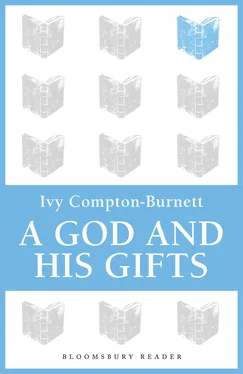“Well, with you I wish he could. As much as would be of use to him. It need be no more. I would not be of use to me. And I do not serve myself.”
“He may in the end. It seems he must.”
“I think he will not. And I do not ask it. I would ask nothing to which I had no right. We have none to be looked up to.”
“Some of us have earned it. We know you are among them.”
“Not in my own family. I have earned it in many others. I am what is called a household word. It is what I wanted and have had. My son has other hopes. He has told you what they are.” Hereward smiled and then let his voice get fuller. “My wish is to reach the multitude, to go deeper into many hearts. I think it comes from a deeper one. It meets a greater need.”
“The difference in Merton may be in himself. His aims must come from his powers, as everyone’s must. They may be nearer to yours as they grow. And that will show him their distance.”
“Ah, I should have had a daughter. I have always known it.”
“You will have one now. And you will have others through your other sons.”
“I only want one. It is what I need. It is the classic relation, rooted in the past. My wife has done much for me. But now all she can do. And my sons go their distance, and can go no further.”
“It must be true of all of them. It would have to be.”
“Yes, I should remember. You will help me not to forget. I know what they have to give. They do not fail to give it. I myself can say no more.”
“You always have your sister?”
“We have gone through life together. She goes with me still. She will always go with me. I have no doubt of her. And my wife has not grudged us to each other. I have had all I could from both.”
“And now you will have something from me. On my own small scale.”
“It will be what I want, what I have not had. You will come to me often, come when I am thought to be alone. It is what a daughter would do.”
“What are you saying, Hereward?” said Ada. “You will bewilder Hetty and ask too much of her. You have no right to ask anything yet. You are going too fast and too far. Merton is turning his eyes on you.”
“I am taking what he gives me. We do not reject a gift.”
“I have become so many things,” said Hetty. “And I am still only myself.”
“I can’t say he has given me a sister,” said Reuben. “He might turn his eyes on me.”
“Do you feel you can say it?” said Hetty, smiling at Salomon, whose voice had been more seldom heard.
“Well, it is all a matter of Merton’s eyes.”
“He is giving me a grand-daughter,” said Joanna. “But I am not sure that he thought of it. I believe he just meant to give himself a wife.”
“So you need not show your gratitude,” said Salomon. “And it might be a false step.”
“I shall not show any. I see no reason. And it is better not to take steps. They are so often called false.”
“The evening is too much of a success,” said Merton. “I must appeal to you, Aunt Penelope. A great-aunt is a safe character. Will you give Hetty your protection? Mine is not enough.”
Penelope and Hetty turned to each other, the former at a loss for words, the latter at none.
The evening moved to its end. Alfred and his sister took their leave. When Merton returned from taking Hetty home, Galleon was standing in the hall.
“May I add my congratulations, sir?”
“You may. I am in a mood to expect them. I feel they are earned.”
“May I also be glad of the accompanying circumstances, sir?”
“You may. I am glad of them myself. They will mean more ease.”
“Complete ease I imagine, sir,” said Galleon, smiling. “There will be no call for anything else.”
“My work may improve, when I have no sense of urgency.”
“Or be discontinued, sir,” said Galleon, in an almost roguish tone.
“You would hardly expect me to do nothing.”
“Well, sir, if there is no need of anything.”
“Would you like to do nothing yourself?”
“Well, sir, I appreciate my occasional leisure. Nothing further is in question.”
“But you would not like leisure and nothing else?”
“Well, sir, my life being of the opposite nature, I have no means of judging. I sometimes wish the duties were intermittent.”
“As mine are? I have to wait on the mood. It must be so with my kind of work.”
“It is not with mine, sir. Mood is not taken into account. It might lead to inconvenience.”
“I believe you think writing is not real work.”
“Well, sir, there is no great resemblance.”
“It is not like digging potatoes?”
“No, sir, or like the manual duties of a house.”
“Well, that is something.”
“Yes, sir, it is in its favour.”
“There is something I have not dared to tell you, Galleon,” said Reuben.
“Oh, the attempt at schoolmastering, sir. It is a passing phase.”
“Suppose it is a lasting one?”
“There is hardly any likelihood, sir.”
“It is little better than writing?” said Salomon.
“Well, sir, hardly as good,” said Galleon, in a serious tone. “In writing you are master of yourself, and there are no contacts.”
“We ought to love our pupils,” said Reuben.
“It is our neighbours, sir. The term is hardly inclusive.”
“So our pupils are not neighbours?”
“Well, if their attitude was neighbourly, sir! But I gather it is not the case.”
“But we are supposed to love our enemies.”
“Well, if that is the ground, sir.”
“Their attitude does present problems.”
“Well, you will not have to solve them, sir.”
“Why not? I have no share in my brother’s prosperity.”
“And prosperity need not end all human effort,” said Merton.
“It tends to end a good deal, sir. It is often its object.”
“I suppose another side of us can assert itself.”
“Our better nature, sir? There is not always any need of it. In which case it is not resorted to.”
“There is surely need of yours, Galleon,” said Salomon.
“Well, sir, my life consisting of service to others, it must at one time have asserted itself once for all.”
“But you do not remember it?”
“There is no point in recalling it, sir. It was not to my advantage.”
“You did not really wish to live for others?”
“Well, sir, it was perhaps as far as I could go in living for myself. It could not be to any great length.”
“You don’t enjoy a glow of righteousness?”
“I am not subject to glows, sir. There is need of something to give rise to them.”
“I believe I could be,” said Reuben. “And I suppose Merton is at the moment.”
“It is true,” said his brother. “And the moment fore-shadows a life.”
“Here is a man we have not known,” said Salomon.
“You are simple in your idea of me. Have you no depths yourself?”
“Yes, I have them myself.”
“Then you have a weak imagination.”
“Well, you need me to have such a strong one.”
“One would think nothing had ever happened to you.”
“Well, nothing ever has,” said Salomon.
“And this has made you realise it?”
“It may have brought it home to me. And I am affected by the change in your life.”
“And you would like a change in your own?”
“Well, I think I have become unfit for it,” said Salomon.
“What is it, Merton, my son? You have something on your mind? You will not hide it from your mother. Tell her what it is.”
“I can tell the assembled family. Indeed I was about to. I will tell you first, if you will find it an advantage. I am not going to be married.”
Читать дальше












